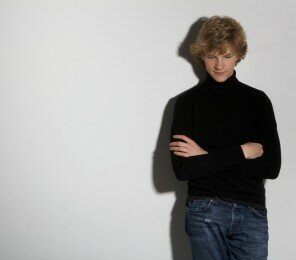Introducing Jan Lisiecki, “an exceptional pianistic talent”

Jan Lisiecki
The lucky audience which attended the UW President’s Piano recital at Meany Hall Wednesday was privileged to hear the Northwest debut of perhaps the most exceptional pianistic talent to be presented here in a generation, perhaps two generations, or more. I don’t think, after six decades of concertgoing, I have ever heard a young man with the kind of mature musicianship and technical ease displayed by 16-year-old Jan Lisiecki. I heard several other audience members commenting, “This is thrilling.”
This Polish-Canadian young man from Calgary began his concert career aged nine, and has been concertizing all over the world, in recital, as orchestral soloist, and as chamber musician. He graduated high school January 2011 after being accelerated four grades by Calgary’s school board, and he speaks four languages. One wonders when he has had the time to learn all this.
It would be easy to think, before hearing him, that this would be a technical whiz kid whose musical intention would be to play everything faster, louder and more spectacularly than anyone else. Or, that his musical tastes would be parroted, at this age, from a fine teacher. And we’d be wrong in both cases. Technically, he is already a master, with his hands completely at the service of the music. Musically, there is no doubt these are his own interpretations of music which he has subjected to profound consideration. His programming is clearly his own.
Lisiecki is a sober presenter. Clad in a plain black suit and tie, he walks out on stage, bows, sits down, takes a moment of sitting quietly, hands in lap, and then plays. No arm waving, no body swaying, nothing to distract from the music.
And the music!
He chose to start both program halves with a Bach Prelude and Fugue, No. 14 in F-Sharp Minor, and No. 12 in F Minor, following those with Beethoven, Liszt and Mendelssohn, then Chopin.
His Bach was orderly with subtle dynamic nuance, clear articulation and rock-steady tempi. His Beethoven, Sonata No. 24 in F-Sharp Major, was remarkable for its ease of touch and lightness on the keys, with plenty of light, shade and dynamism, but no fortissimos. Lisiecki appears to stroke the notes out of the keys, and legato runs sounded like a flow of sunshine.
His intelligent approach to Liszt’s Trois études de concert elucidated some of the mysteries of the composer’s thinking, something which often gets steamrollered by the chance to let everything roll out in an emotional outpouring. This had depth, and here, as in Mendelssohn’s Variations sérieuses in D Minor, Lisiecki could extract rich fortes from the piano without ever going overboard.
He ended the concert with Chopin’s Twelve Etudes, Op. 25, a good choice to finish with its fireworks towards the end, though each etude had technical difficulties to marvel at, his were so neat, so lively, so clean, and at the same time so thoughtful, so musically right, and apparently so easy. Lisiecki’s hands were relaxed all evening. He never pounded to achieve emphasis or volume, they were just there. Nor did he seem to tense up for runs, no matter how fast, and flawlessly even.
In short, a mature musician, no matter his chronological age. I found myself thinking he’s in the same genre as Alfred Brendl, a thinking musician’s musician.
A reminder: The UW World Series offers up to two Free Youth Tickets (ages 5-17 only) with the purchase of every regular price ticket. The Free Youth Ticket was created to engage young audiences in classical music and encourage families to share the experience of hearing great music together. The offer may be redeemed for any remaining 2011-12 Chamber Music or President’s Piano Series event by mentioning the promotional code “PRELUDE” at the time of ticket purchase. Available via phone and in-person orders only.

 Daily Email Digest of The SunBreak
Daily Email Digest of The SunBreak